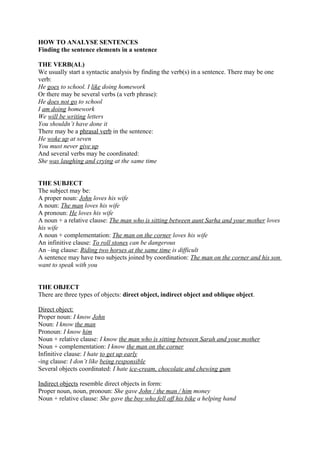
How to analyse sentences
- 1. HOW TO ANALYSE SENTENCES Finding the sentence elements in a sentence THE VERB(AL) We usually start a syntactic analysis by finding the verb(s) in a sentence. There may be one verb: He goes to school. I like doing homework Or there may be several verbs (a verb phrase): He does not go to school I am doing homework We will be writing letters You shouldn’t have done it There may be a phrasal verb in the sentence: He woke up at seven You must never give up And several verbs may be coordinated: She was laughing and crying at the same time THE SUBJECT The subject may be: A proper noun: John loves his wife A noun: The man loves his wife A pronoun: He loves his wife A noun + a relative clause: The man who is sitting between aunt Sarha and your mother loves his wife A noun + complementation: The man on the corner loves his wife An infinitive clause: To roll stones can be dangerous An –ing clause: Riding two horses at the same time is difficult A sentence may have two subjects joined by coordination: The man on the corner and his son want to speak with you THE OBJECT There are three types of objects: direct object, indirect object and oblique object. Direct object: Proper noun: I know John Noun: I know the man Pronoun: I know him Noun + relative clause: I know the man who is sitting between Sarah and your mother Noun + complementation: I know the man on the corner Infinitive clause: I hate to get up early -ing clause: I don’t like being responsible Several objects coordinated: I hate ice-cream, chocolate and chewing gum Indirect objects resemble direct objects in form: Proper noun, noun, pronoun: She gave John / the man / him money Noun + relative clause: She gave the boy who fell off his bike a helping hand
- 2. Oblique object: Sometimes the indirect object in a sentence with both direct and indirect objects (e.g.: she gave the man money) is realised as a prepositional phrase: She gave money to the man And sometimes the oblique object cannot be rephrased as direct object: Can you post this letter for me? (you cannot say: can you post me this letter?) SUBJECT COMPLEMENT (PREDICATIVE) In form the subject predicative may look like a direct object, but whereas the direct object and the subject denote two different entities, the subject predicative describes the subject, i.e. there is identity between the subject and the subject predicative. Proper noun: His name is Max Noun: John is a boy (an extremely nice boy) Adjective: She became famous OBJECT COMPLEMENT (PREDICATIVE) The object predicative has the same relationship to the object as the subject predicative has to the subject: They call him Max They made her famous ADVERBIAL There are many types of adverbial, but the three most common are: Adverbial of time: He woke up at seven She plays the piano every day He came after the show had started I’m leaving now He left before anyone could stop him Adverbial of place: They live in London The bus stop is just around the corner Mary was at home last week I want to go there Adverbial of manner: He searched the room carefully She sings beautifully He went slowly up the stairs We gradually go used to it
- 3. To sum up; this is how you analyse – step by step: Example sentences: 1. John has a good friend 2. John is a good friend 3. John gave his friend money 4. John gave money to his friend 5. John is at home 6. John made his friend happy - Find the verb - Ask who / what + the verb (and the rest of the sentence): who has (a good friend) / who made his friend happy to find the subject - Ask the subject + the verb + who / what: John has what / John gave what to find the direct object. But! This is also how you find subject complement (predicative): John is what So you need to know the difference between object and subject complement (predicative) (subject predicatives describe or identify the subject) - Ask subject + verb + direct object + to whom: John gave money to whom to find the indirect object (his friend) - If the object begins with a preposition (to his friend) it is called oblique object. There is no semantic difference between (3) and (4), but sentences with oblique objects may not always have a counterpart with an indirect object: John stole money from his friend (i.e. you can’t say John stole his friend money - The relationship between object and object complement (predicative) is the same as the one between subject and subject complement (predicative): John made his friend happy S + V + O + OP His friend is happy S + V + SP - Ask when / where / why / how / how often, much, far … to find the adverbials: John is where John has a good friend S V DO John is a good friend S V SC John gave his friend money S V IO DO John gave money to his friend S V DO OO John is at home S V A John made his friend happy S V O OC